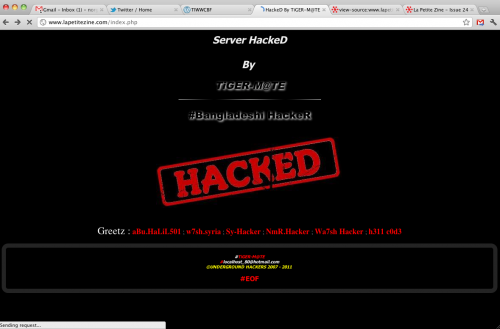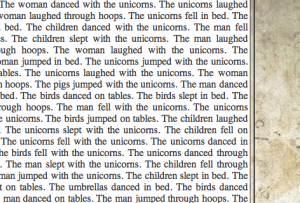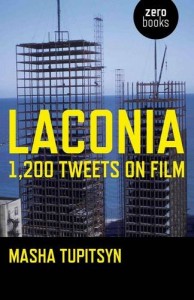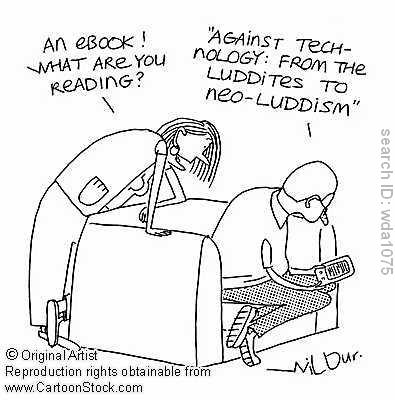Hacked by Tiger-M@te
 Regular readers of literary magazines (read: hopeful authors) were surprised this weekend to find their favorite literary magazines nearly completely destroyed by a vindictive and highly talented hacker operating on the other side of the globe. Most notably, Third Coast, Monkeybicycle, and La Petitie Zine were hacked this weekend, suffering from the attentions of infamous Bangladeshi hacker Tiger-M@te, who is responsible for many high-profile world wide web hacks. Earlier this year, he brought down Google’s Bangladeshi site, and now he is in the process of defacing popular, highly regarded websites like resellerproductlist.com and terrysdigitalproductstore.com.
Regular readers of literary magazines (read: hopeful authors) were surprised this weekend to find their favorite literary magazines nearly completely destroyed by a vindictive and highly talented hacker operating on the other side of the globe. Most notably, Third Coast, Monkeybicycle, and La Petitie Zine were hacked this weekend, suffering from the attentions of infamous Bangladeshi hacker Tiger-M@te, who is responsible for many high-profile world wide web hacks. Earlier this year, he brought down Google’s Bangladeshi site, and now he is in the process of defacing popular, highly regarded websites like resellerproductlist.com and terrysdigitalproductstore.com.
Poetgramming
 I have been paying attention lately to the work of Adam Parrish, who teaches occasional courses on programming as it applies to creative writing at NYU. I have not taken this course, but would love to hear from anyone who has. I have been interested lately in the idea of using programming functions as aids to writing fiction and poetry. Some of my recent work has explored the aid of small scripts to randomize and change variables over constant frequencies.
I have been paying attention lately to the work of Adam Parrish, who teaches occasional courses on programming as it applies to creative writing at NYU. I have not taken this course, but would love to hear from anyone who has. I have been interested lately in the idea of using programming functions as aids to writing fiction and poetry. Some of my recent work has explored the aid of small scripts to randomize and change variables over constant frequencies.
Online Literature Calender at Zine-Scene
 Zine-Scene is a website devoted to promoting online literature through journal reviews, author spotlights, and its own literary quarterly, which reprints fiction that previously appeared in print only. Keeping with this mission we have launched an Online Literature Calendar. The calendar displays the release dates of online literary magazines and makes finding new literature easy and user friendly.
Zine-Scene is a website devoted to promoting online literature through journal reviews, author spotlights, and its own literary quarterly, which reprints fiction that previously appeared in print only. Keeping with this mission we have launched an Online Literature Calendar. The calendar displays the release dates of online literary magazines and makes finding new literature easy and user friendly.
“The Writer”
Carson Mell has a story in the new Electric Literature, which I bought because he and Lynne Tillman were published in it. I bought a copy of that and all the Supermachines (which are at least as great as everyone says they are because it’s true) and so I felt really indie lit and hip and stuff for about a week on the bus with people wondering “oh that must be the contemporary literature I hear so much about never” and then I fucked around and started re-reading a book that was written ninety years ago and which made me feel I could climb a building if I only wanted to.
Anyway I don’t much care for Mell’s fiction and I thought the publication quality of Electric Literature was quite poor considering how cool their website is, but then they do manage to pay their contributors and obviously care much more about the web with their apps and all, so maybe that makes up for it. I dunno nothing. Lynne Tillman’s thing was great of course. All in all though, I was underwhelmed. But I still think Carson Mell is a genius at making these videos, so who gives a shit I guess.
Pleasing the Spiders OR Google: Oprah+[current event], Facebook
<head>
<meta name=”keywords” content=”search engines, better than people, angry writer, depression”>
<meta name=”description” content=”Who needs fans when you have Google?”>
</head>
<div id=”post”>
<h2>Pleasing the Spiders OR Google: Oprah + [current event], Facebook</h2>
<div id=”context”>
<p>Google’s index is made up of billions of web pages, making it the largest web page database, and possibly the largest knowledge repository, in the world. Google currently handles 70% of all search engine queries. As of October 2010 Google has scanned over 15 million books. The term “what to read” is searched 60,500 times monthly. What happens when humans are no longer necessary tastemakers? Being a hipster will no longer mean having access to early Domino and the Cheese Willys tracks. Being a hipster will mean having access to something–anything–not catalogued by Google. (Don’t panic, hipsters; I made up Domino and the Cheese Willys)</p>
<p>Search engines utilize top-secret algorithms to provide users with relevant information based on search terms. Anything online is susceptible to Google’s search spiders, which includes every story, every poem, every essay ever posted online. Is the next step in creative writing then to produce content with the search engine in mind? Will meta-data be its own keyword rich bank to be used as bait for inbound links? Will every other word be hyperlinked in hopes of attracting returning links? What will this do to our already dwindling attention span? Or, more optimistically, have our attention spans evolved to properly accept so much stimuli?</p>
<p>But despite the obvious cringe factor (ads in eBooks frightens me), I am less pessimistic about what will come from the first author to truly tap into the growing eBook medium. Think what Mark Z. Danielwski would have done with House of Leaves if the eBook platform was viably open for development. Until something big happens, though, I fear we will have to endure a lot of failed attempts (no hyperlink necessary; use your imagination).</p>
</div>
</div>
<div id=”footer”>
<p>This is a gust post by Caleb J Ross as part of his Stranger Will Tour for Strange blog tour. His goal is to post at a different blog every few days beginning with the release of his novel Stranger Will in March 2011 to the release of his second novel, I Didn’t Mean to Be Kevin in November 2011. If you have connections to a lit blog of any type, professional journal or personal site, please contact him. He would love to compromise your integrity for a day. To be a groupie and follow this tour, subscribe to the Caleb J Ross blog RSS feed. Follow him on Twitter: @calebjross. Friend him on Facebook: Facebook.com/rosscaleb.</p>
</div>
Luddites were people too
The Luddites were a group of British textile workers in the 19th century who destroyed their newly automated mechanized looms. They were afraid of the advancement of technology and how it would impact their jobs.
 The Luddites derived their name from Ned Ludd. According to the mythology, in 1779, Ludd smashed two knitting frames, either because of a “fit of passion” or because he was lazy and didn’t want to work or because some kids were making fun of him.
The Luddites derived their name from Ned Ludd. According to the mythology, in 1779, Ludd smashed two knitting frames, either because of a “fit of passion” or because he was lazy and didn’t want to work or because some kids were making fun of him.
From then on, if a loom was destroyed and/or sabotaged, the workers would blame “Ned Ludd.”
By the time the Luddites formed in 1811, Ned Ludd was a mythological figure.
Ned Ludd may or may not have ever existed.
Ned Ludd may have been a lazy dude who didn’t want to fucking weave anymore, so he smashed his loom. And the Luddites named themselves after him. READ MORE >
This again, not this again
 I wasn’t going to write this, feeling like the last thing anybody needs is another post explaining or defending or extolling paper, but then two events became bridged in my mind and I felt like I would be restless until I wrote them, about that bridge, so there you have a little apologia for what follows, which is that I moved some months ago to a new house, and recently found myself sitting on the floor late at night amidst boxes filled with folders and smaller boxes, and several folders were marked MISC and contained all kinds of paper, critical essays that I wrote during college and grad school about Emily Dickinson and Auden and post-structuralism and William Blake, and pages from the first novel I wrote, and pages from the first “novel” I wrote, and notebooks filled with other writings, and long letters never sent, and then I opened a box within a box and it was filled with floppy discs, each one labeled with the year and some vague tags, like “teaching stuff” and “post-mod essays” and “stories/summer” and “Needle,” and I just held those floppies like they were quaint artifacts from my Victorian childhood, realizing that I had no means of accessing their contents, and then stacking them neatly back into their smaller and then larger box, and returning to the piles of paper feeling a kind of profound agitation with regard to permanence or the myth of permanence, and remembering standing outside of the office where I worked just a couple blocks from the World Trade Center READ MORE >
I wasn’t going to write this, feeling like the last thing anybody needs is another post explaining or defending or extolling paper, but then two events became bridged in my mind and I felt like I would be restless until I wrote them, about that bridge, so there you have a little apologia for what follows, which is that I moved some months ago to a new house, and recently found myself sitting on the floor late at night amidst boxes filled with folders and smaller boxes, and several folders were marked MISC and contained all kinds of paper, critical essays that I wrote during college and grad school about Emily Dickinson and Auden and post-structuralism and William Blake, and pages from the first novel I wrote, and pages from the first “novel” I wrote, and notebooks filled with other writings, and long letters never sent, and then I opened a box within a box and it was filled with floppy discs, each one labeled with the year and some vague tags, like “teaching stuff” and “post-mod essays” and “stories/summer” and “Needle,” and I just held those floppies like they were quaint artifacts from my Victorian childhood, realizing that I had no means of accessing their contents, and then stacking them neatly back into their smaller and then larger box, and returning to the piles of paper feeling a kind of profound agitation with regard to permanence or the myth of permanence, and remembering standing outside of the office where I worked just a couple blocks from the World Trade Center READ MORE >




